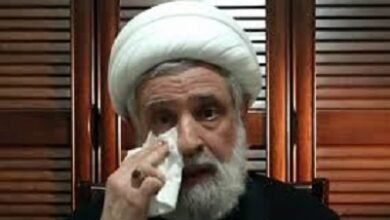US intelligence expects Iran and its Axis to conduct two waves of attacks.
S K Singh:Editor-In-chief

WAR-REPORT: Unspecified US officials told Axios on August 5 that the US intelligence community expects Iran and its Axis of Resistance to conduct two waves of attacks in its retaliation against Israel for the death of Haniyeh in Tehran on July 31. US intelligence officials reportedly briefed a potential scenario to US President Joe Biden and US Vice President Kamala Harris in which Hezbollah would conduct an attack on Israel in a wave separate from another Iranian and Axis attack.
Intelligence officials noted that it is not clear whether Iran and the Axis or Hezbollah would launch the first attack. One unspecified US official cited by Axios said that intelligence reports suggest Iranian and Hezbollah planning is a “work in progress.”

Iran and its Axis of Resistance would likely use the first wave of the attack on Israel to assess Israeli air defenses in preparation for the second wave of the attack. The April 2024 attack consisted of only one large volley of drones and missiles fired from Iran. CTP-ISW noted on August 4 that Iran and its allies could use multiple attacks targeting Israel to learn and adjust their attacks as they observe how successful they are. Iran and the Axis could adjust the volume or type of projectiles fired at Israel, targets, and launch locations.

Iranian-backed Iraqi militia al Thawriyyun claimed responsibility for the rocket attack that injured at least five US personnel at Ain al Assad Airbase in Anbar Province, Iraq, on August 5. This attack marks the third time al Thawriyyun has claimed an attack targeting US forces in Iraq and Syria since July 26. Two Iraqi security sources told Reuters that the militia fired two “Katyusha” rockets at Ain al Asad.
An Iraqi OSINT account reported on August 5 that Iranian-backed Iraqi militias fired 122mm rockets at Ain al Asad. This attack is part of the long-standing Iranian-backed campaign to remove US forces from Iraq. Al Thawriyyun, and the Islamic Resistance in Iraq more broadly, may also seize on the July 30 US self-defense strike in Baghdad and the recent Israeli strikes that killed senior Axis of Resistance leaders to justify renewed attacks against US forces.
CTP-ISW previously assessed that Iran could order simultaneous attacks on US forces as part of its retaliatory attack against Israel. Iranian-backed militia attacks targeting US positions could, in some circumstances, pull US attention and resources away from identifying and intercepting projectiles bound for Israel. Iranian leaders may calculate that their projectiles have a higher likelihood of penetrating Israeli air defenses if the United States must focus on defending its own forces.

Key Takeaways:
- Iranian Retaliation: Unspecified US officials told Axios on August 5 that the US intelligence community expects Iran and its Axis of Resistance to conduct two waves of attacks in its retaliation against Israel for the death of Haniyeh in Tehran on July 31. Iran and its Axis of Resistance would likely use the first wave of the attack on Israel to assess Israeli air defenses in preparation for the second wave of the attack.
- Iranian Attack Preparation: Unspecified US officials cited by the Wall Street Journal on August 5 reported that Iran has begun moving missile launchers and conducting military drills, possibly in preparation for the attack. These drills may be intended to move forces and missile batteries into position for Iran’s retaliatory strike on Israel.
- Nasrallah Speech: Hezbollah Secretary General Hassan Nasrallah claimed that Hezbollah is fighting to prevent Israel from “eliminating the Palestinian cause,” which obfuscates Hezbollah’s goals and Iran’s theory for destroying the Israeli state.
- Hamas Succession: Hamas selected Hamas leader in the Gaza Strip and October 7 architect Yahya Sinwar as the next leader of Hamas’ Political Bureau on August 6. Sinwar exercised significant influence within Hamas after October 7 given his command of forces and control of hostages on the ground. He repeatedly resisted pressure to moderate Hamas’ ceasefire position from both his superiors, such as Haniyeh and others, and his military subordinates in the Gaza Strip. Sinwar’s appointment also marks the continued ascendence of pro-Iran elements within Hamas, and it will likely accelerate Hamas’ descent deeper into Iran’s orbit.
- Iraq: Iranian-backed Iraqi militia al Thawriyyun claimed responsibility for the rocket attack that injured at least five US personnel at Ain al Assad Airbase in Anbar Province, Iraq, on August 5.








